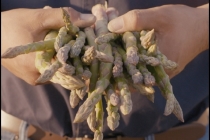Cool IoT Use Cases: Making high-volume organic farming more efficient

Market overview
![]() In drought-ridden California farmers face constant pressure to be more efficient in their water use. Agriculture is key to the state’s economy; it employs about 3% of the workforce and accounts for about 2% of the GDP, says Bob Emmerson.
In drought-ridden California farmers face constant pressure to be more efficient in their water use. Agriculture is key to the state’s economy; it employs about 3% of the workforce and accounts for about 2% of the GDP, says Bob Emmerson.
The problem
![]() California is a major water user: roughly 9 million acres of farmland are irrigated; this represents about 80% of all water used for businesses and homes. While the rains of 2017 brought relief from historic California droughts, more than 90% of the state was in some form of drought in 2016. Walking rows of asparagus and manually probing the ground to check moisture was inefficient and time-consuming.
California is a major water user: roughly 9 million acres of farmland are irrigated; this represents about 80% of all water used for businesses and homes. While the rains of 2017 brought relief from historic California droughts, more than 90% of the state was in some form of drought in 2016. Walking rows of asparagus and manually probing the ground to check moisture was inefficient and time-consuming.
The players
![]() Devine Organics is headquartered in Fresno, CA, where it employs organic farming methods. WaterBit is a precision agricultural irrigation company whose products are designed to deliver the right amount of water at the right place and at the right time. AT&T provides IoT services that enabled Devine Organics to use less water and grow more asparagus.
Devine Organics is headquartered in Fresno, CA, where it employs organic farming methods. WaterBit is a precision agricultural irrigation company whose products are designed to deliver the right amount of water at the right place and at the right time. AT&T provides IoT services that enabled Devine Organics to use less water and grow more asparagus.
The solution
![]() Small, solar-powered sensors deployed by WaterBit collect data on soil moisture and field conditions. No maintenance is needed; they are placed under the foliage in order to avoid interference with field operations. Data is sent to a communications gateway hub that can be thousands of feet away. The gateway uses an AT&T Global SIM card and IoT services to send secure data over an LTE network to the WaterBit cloud application where it is analysed.
Small, solar-powered sensors deployed by WaterBit collect data on soil moisture and field conditions. No maintenance is needed; they are placed under the foliage in order to avoid interference with field operations. Data is sent to a communications gateway hub that can be thousands of feet away. The gateway uses an AT&T Global SIM card and IoT services to send secure data over an LTE network to the WaterBit cloud application where it is analysed.
Devine Organics employs analysis and scheduling tools through WaterBit’s mobile app, allowing them to control irrigation timing and duration, fine-tuning as the soil’s needs vary. The WaterBit Dashboard provides a comprehensive overview of his field’s moisture and irrigation status.
![]() Since installing the sensors, Devine Organics has doubled its asparagus harvest on the field and reduced water use there by more than 750,000 gallons—the equivalent of more than 43,000 Americans skipping a shower for a day.
Since installing the sensors, Devine Organics has doubled its asparagus harvest on the field and reduced water use there by more than 750,000 gallons—the equivalent of more than 43,000 Americans skipping a shower for a day.
Business benefits
- Crop production increase from 800 to 1500 pounds/acre
- 5% drop in labour hours and cost
- 5% reduction in greenhouse gas emissions from fuel used for pumping water
- Less nutrient usage because of a reduction in leaching
The author is freelance IoT writer, Bob Emmerson
Comment on this article below or via Twitter @IoTGN
